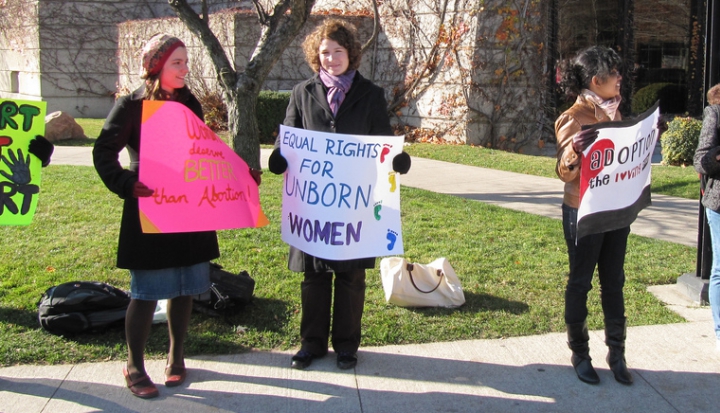In a unanimous 9-0 ruling released yesterday in the case of McCullen v. Coakley, the Supreme Court struck down a Massachusetts law that created a 35-foot buffer zone around abortion clinics, designed to keep pro-life advocates at a distance. But although the decision was unanimous, there was a fair amount of disagreement among the justices as to why the law should be struck down.
Chief Justice John Roberts, writing the opinion of the court, agreed that the Massachusetts law protects valid public interests such as "public safety, patient access to health care, and the unobstructed use of public sidewalks and roadways." But it does so at a significant burden to the First Amendment free speech rights of others, namely the pro-lifers who line the sidewalks in hopes of talking to women before they enter the clinic to obtain an abortion. Roberts concludes that there are other types of laws the state can pass to protect its interests before going so far as to create a burden on free speech. (It seems to follow that such a burden on speech could, however, be considered legitimate in some circumstances had all other options been exhausted.)
What the majority of justices did not find, however, is that the law specifically targeted a certain type of speech (in this case, pro-life views). They believe, Roberts writes, that the law was in fact content neutral, meaning that it wasn't an attempt to silence the speech of abortion opponents just because their views make others uncomfortable. The law's intent was not to discriminate, the justices find, but to protect legitimate interests of the state.
But other justices disagreed, creating the more familiar 5-4 split in the court's opinion even though all nine justices ultimately voted the same way. Samuel Alito, filing a separate opinion, wrote that, "As the Court recognizes, if the Massachusetts law discriminates on the basis of view point, it is unconstitutional … and I believe the law clearly discriminates on this ground." Justice Antonin Scalia also wrote a much more critical rebuke of the law and its intent (not to mention the thinking of some of his fellow justices).
Not surprisingly, pro-life advocates are celebrating the decision, and perhaps also not surprisingly, they seemingly have latched on to the opinions of Scalia and Alito (that they were being discriminated against) rather than the majority opinion of Roberts (that the law was an overreach toward a legitimate end). The U.S. bishops, who had filed an amicus brief in the case, released a statement from Boston's Cardinal Seán O’Malley calling the law "discriminatory" and saying that it was an attempt by "abortion supporters" to attack the rights of pro-life Americans. No mention is made of the fact that Chief Justice Roberts clearly explained that the law does no such thing, and that wasn't the reason why he and four other justices voted against it. Other statements from pro-life groups took a similar stance of casting the decision as a victory for the rights of pro-life advocates.
The court's decision in this case is an important one, but it is also narrow. Many questions about how this decision can apply in other situations remain unanswered. While some justices seemingly were willing to get into the murky waters of the abortion debate, the majority believed this case had nothing to do with discrimination against people with pro-life views. Though the case has been decided in the favor of pro-life advocates, it isn't exactly the landmark victory that they were hoping for.
Wikimedia image cc by University of Toronto Students for Life










